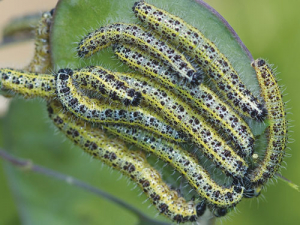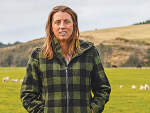Eradication of the great white butterfly – a threat to brassicas including forage crops and commercial vegetables – is a world-first achievement, says Primary Industries Minister Nathan Guy.
The eradication was officially announced on November 23, Guy claiming it as a major illustration of how a new biosecurity strategy – announced the day before – can work using community involvement.
Nelson children played a role in eradicating the great white butterfly which can devastate vegetable and dairy forage crops. The butterfly is also a big threat to native species.
Experts at the Biosecurity Forum 2016 in Auckland in late November told Rural News that the butterfly bounty scheme involving kids – initially laughed at – played an important role in eradicating the butterfly. It particularly showed how biosecurity awareness could be engendered in a younger generation.
“A $10 bounty for dead butterflies was a powerful incentive during the spring school holidays in 2013, with children netting 134 of them,” Conservation Minister Maggie Barry says.
It is the first eradication of an unwanted butterfly population in the world, Barry says. Community involvement on a wide scale was crucial.
DOC rangers did 263,000 searches on 29,000 properties in the Nelson region for the butterfly and its eggs, caterpillars and pupae.
“People also kept watch for the butterflies, reported finds and allowed repeated searches of their gardens; all in all, without the help of the people of Nelson the butterfly may well have eventually spread across the country,” Guy says.
The great white butterfly, first seen in Nelson in 2010, is a major pest of brassica crops. Caterpillars feed voraciously in groups, rapidly reducing host plants to skeletons.
The director-general of the Department of Conservation, Lou Sanson, says the great white butterfly eradication is probably their most successful such campaign. DOC first thought it would cost $20 million, but it ended up costing about $5m over four years.
One of five key strategies of Biosecurity 2025 is to have “a biosecurity team of 4.7 million -- participation on a grand scale, with every New Zealander and every NZ business becoming part of the team,” Guy says.
It aims to have by 2025 at least 75% of adult NZers understanding biosecurity.
Guy announced the Biosecurity 2025 strategy at the “Protecting to Grow New Zealand” forum in Auckland.
Aside from biosecurity awareness among 4.7 million people, other targets to be reached by 2025 include:
- Having 90% of relevant businesses actively managing pest and disease risks
- A publicly accessible network that enables electronic access to organism data held by central government agencies, regional councils and Crown research institutes
- Public and private investment doubling to at least $80 million in science for biosecurity, with at least 50% of the investment focused on critical biosecurity areas
- Identifying 150,000 skilled people who can be quickly drawn on to support responses to biosecurity incursions. About 60,000 people would now be available.



















